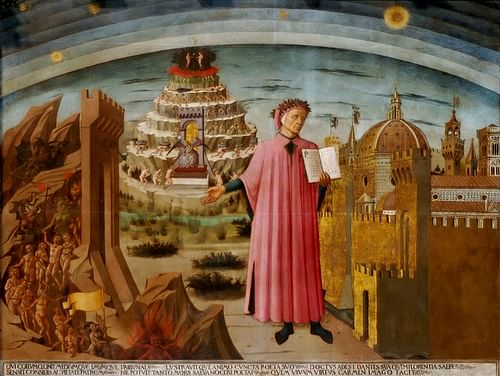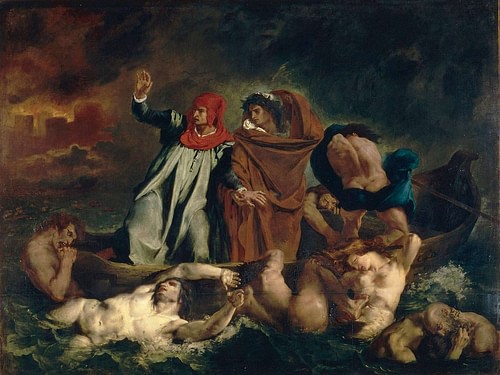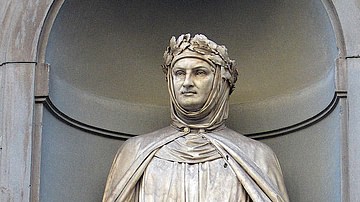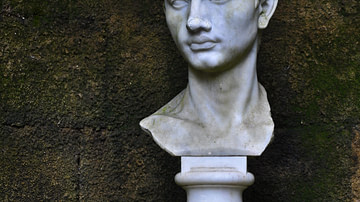
Dante Alighieri (1265-1321) was an Italian poet and politician most famous for his Divine Comedy (c. 1319) where he descends through Hell, climbs Purgatory, and arrives at the illumination of Paradise. Dante meets many historical characters along the way, including his guide, the Roman poet Virgil (70-19 BCE). It is considered one of the greatest works of medieval literature.
An innovative poet, Dante's work became a bridge between medieval and Renaissance Europe as the focus of art and thought shifted from religious affairs to those of humanity. Active in politics in his home city of Florence, he was eventually exiled for his views against what he saw as the abuse of power and corruption of the popes. Another of Dante's lasting contributions to Italian culture was his promotion of the Tuscan dialect, which ultimately became the standard for the Italian language.
Political Life
Dante Alighieri was born in Florence in 1265, the son of a moderately wealthy landowner. His mother died when he was just seven years old and his father when he was a teenager. As a young knight, Dante actively participated in the 1289 Battle of Campaldino between the rival cities of Florence and Arezzo and their respective allies. The two sides in this battle were divided over their support for either the Pope (the Guelphs) or the Holy Roman Emperor (the Ghibellines), a rivalry that would cause a chasm in Florentine politics that lasted over half a century.
Back in Florence, Dante worked as a municipal official and was involved in politics between c. 1295 and 1302. In 1300 he was elected to the prestigious position of prior of the city (one of seven). Contrary to the government of Florence, Dante wanted to see his city free from papal interference, which he saw as a morally corrupt institution. He was further disillusioned with Rome following the Pope's enforced exile to Avignon in 1309. Dante began to support, instead, the ambitions of the Holy Roman Emperor, although his political allegiance shifted depending on circumstances. Dante nurtured hopes that the Holy Roman Empire would restore Christian order to Europe. In this he was hopelessly wrong, but he did at least correctly predict that the bickering between the different Italian city-states would only lead to the downfall of all.
Dante was effectively exiled for his political views in January 1302. As the translator D. L. Sayers notes in her introduction to Hell, part I of the Divine Comedy, Dante had "three gifts hampering to the career of the practical politician: an unaccommodating temper, a blistering tongue, and an indecent superfluity of brains" (xxxii). Dante was duly charged with massive corruption by officials belonging to a rival political faction. The charges were fictitious but the sentence was real enough: to be burnt at the stake. Understandably, Dante, then on his way back from Rome, chose to avoid Florence. Never settling in any one city thereafter, Dante first went to Verona, then moved around central and northern Italy. Meanwhile, Dante's wife Gemma Donati and their three sons and daughter remained in Florence. It was during this wandering exile that he wrote his masterpiece, the Divine Comedy. Dante never did return home, and he died of malaria in Ravenna on 13 September 1321.
Prose Works
Dante's written works are a heady mix of philosophy, politics, and literature. They show in their panoramic inclusion of many fields of knowledge such as classicism and biblical studies, an influence from his one-time mentor Brunetto Latini (c. 1220-1294), the celebrated Florentine scholar and statesman. Dante wrote political treatises like Monarchy (De Monarchia, c. 1313), which speculated on the nature of God, and for this, he was labelled a heretic by some. Monarchy criticised the corruption and immorality in the Papacy and proposed that a secular imperial power should govern the world, which would then witness a new spiritual age. Dante, himself a devout Christian, quoted the Bible in support of his belief that the Pope should have nothing to do with government and so had no power to choose who would be emperor of the Holy Roman Empire. As Jesus Christ himself had said in the scriptures, "my kingdom is not of this world" (John 18:36). The Pope was the spiritual leader of the medieval Church but was not, said Dante, the head of an empire.
If the principle of freedom is explained, it will be apparent that the human race is ordered for the best when it is most free. Observe, then, those words which are on the lips of many but in the minds of few, that the basic principle of our freedom is freedom of the will.
(De Monarchia, Chapter XII, par. 1)
Finally, Dante's De vulgari eloquentia (On Vernacular Eloquence) was a robust defence of the Tuscan dialect, even if it was, ironically, written in Latin.
Poetry
Dante wrote poetry, mostly along the lines of medieval courtly love poetry and similar themes which were then applied to the contemporary context of the Italian city-state. Indeed, it was Dante who coined the name dolce stil nuovo (aka stilnovismo or 'sweet new style') that describes this genre of poetry. Dante's own passions seem to have concentrated on one Beatrice Portinari, a childhood sweetheart who had died in 1290, and she appears in his works, notably as a guide in the final part of the Divine Comedy. His most celebrated collection of poems is La Vita Nuova (The New Life, c. 1293), which mixes the themes of unrequited courtly love with elements of philosophy, particularly Stoicism. Dante dedicated The New Life to his great friend and fellow poet and advocate of Tuscan dialect, Guido Cavalcanti (d. 1300). Dante's follow-up to The New Life was the Convivio (The Banquet), c. 1304-1307), another anthology of poems and commentaries which reveal Dante's love of philosophy and his native language.
Dante innovated with terza rima, that is poems formed of stanzas of three rhyming lines, a technique best seen in his Divine Comedy. Besides their artistic merit, Dante's poetry, written in the vernacular, did much to promote the Tuscan dialect, which eventually became the standard in Italian literature and language in general. However, the poet's vocabulary was not limited to Tuscan, and he used words from many other Italian dialects in his work.
The Divine Comedy
Dante's greatest contribution to medieval literature was his Divine Comedy (La divina commedia) which was written between 1304 and 1319 but not printed widely until 1472. The name 'comedy' derives from the label then used for a genre where works have a positive ending (or in this case not a negative one, at least). 'Divine' was added to the title in the mid-16th century because of the high esteem which the work continued to command. The epic poem is divided into three parts or canzoni: Hell, Purgatory, and Paradise (Inferno, Purgatorio, and Paradiso). Each part is comprised of 33 canti or episodes, and there is one introductory canto, bringing the total to a perfect 100. Each of the 14,233 lines therein consists of precisely eleven syllables and the rhyme follows the following pattern over each group of three lines: aba, bcb, cdc, etc. The structure of the work alone is a remarkable creation of symmetrical poetic architecture.

Dante is himself the central character of his work as he embarks on a "journey through a civic Hell, a rural, mountainous Purgatory, and a mystical astral Paradise" (Hutchinson, 122). The story is set in 1300 at Easter time, and Dante describes the characters he meets along the way on his pilgrimage, usually real historical people, and their deeds when alive.
And now the woeful sounds of actual pain
begin to break upon mine ears; I now
am come to where much wailing smiteth me.
I reached a region silent of all light,
which bellows as the sea doth in a storm,
if lashed and beaten by opposing winds.
The infernal hurricane, which never stops,
carries the spirits onward with its sweep,
and, as it whirls and smites them, gives them pain.
Whene'er they come before the shattered rock,
there lamentations, moans and shrieks are heard;
there, cursing, they blaspheme the Power Divine.
I understood that to this kind of pain
are doomed those carnal sinners, who subject
their reason to their sensual appetite.
(Hell V, 53)
Inferno and Purgatorio both contain criticism of what Dante saw as the corruption of papal authority, indeed, several popes find themselves in Dante's version of Hell, accused of being shepherds who have favoured gold over their flocks. Down there in the pit with the popes are clergy who sold ecclesiastical positions and privileges for personal profit.

Hell
Dante's guide through the various levels of Hell is the Roman author Virgil, chosen perhaps because he represents classical reason and because he, too, foresaw the rise of Rome, a blossoming that Dante hoped to see happen in Europe under the Holy Roman Empire. Also finding themselves in the quagmires of Inferno are, of course, sinners of all kinds, and, besides popes, more expected villains like Cain, the first murderer, and the assassins of Julius Caesar (c. 100-44 BCE). There is even a delicious description of a huge Satan with his six eyes and three mouths, gorging on Judas Iscariot's head.
Ah, Italy, thou slave, thou inn of woe,
ship without pilot in a mighty storm,
not queen of provinces, but house of shame!
(Purgatory VI, 69)
Purgatory
Dante moves on to Purgatory, the Christian waiting room of the afterlife, where those not evil enough to be detained in Hell nurture hope of one day reaching Heaven. Here, Dante the character begins his process of spiritual rehabilitation while Dante the writer continues to show a breathtaking conceit in placing his villains and his heroes where he thinks they belong according to their deeds in this life. It is a ruthless attack on Dante's political rivals and the poor political and moral health of Italy at the time of writing. However, in the end, it does not really matter if Dante's assessments are accurate, the point of this section is really for the reader to more clearly identify the consequences in eternity of one's actions in this life. The condemnation of real people in a fictional tale certainly adds to the power of Dante's message but it was a strategy not without its consequences. The banker Reginaldo Scrovegni of Padua, for example, was a notorious moneylender, and he is mentioned by Dante as the worst example of the sin of usury. This unflattering appearance perhaps led Reginaldo's son Enrico to build the Scrovegni chapel and have Giotto (b. 1267 or 1277 - d. 1337) decorate its interior as a sort of penance.
Before me now, with wings outspread, appeared
the lovely image, which in sweet fruition
those joyous interwoven spirits made.
Each one of them a little ruby seemed,
wherein a ray of sunlight burned so brightly,
that it was mirrored back into mine eyes.
(Paradise XIX, 217)
Paradise
Finally climbing to the peak of Purgatory, Dante reaches the end of his journey of illumination by finding himself in Paradise, where he is now guided by his lost-love Beatrice. In this section, Dante speculates on the physical aspects of heaven and muses on history, theology, and cosmology. Heaven is full of light, swirling orbs, and sparkling jewels. Ultimately, Paradise is a place of hope as Dante reminds his reader of the point of the whole poem: that he or she, too, will reach this lovely place, if only they embrace 'the Love that moves the sun and other stars'.
The Divine Comedy was immediately popular as hundreds of manuscript copies were made and distributed across Europe. There were many commentaries written on it, and the work was praised and promoted in public lectures by such literary luminaries as Giovanni Boccaccio (1313-1375) and Petrarch (1304-1374). In the end, the Divine Comedy became inseparable from the author and was simply known as Il Dante. Another boost to its popularity came around 1472 when it was printed for the first time. The success continued, and by 1600, 50 editions had been printed.
Legacy: the Renaissance & Beyond
The printed revival of Dante's work led to him becoming known as the 'first Renaissance poet', even if there was not really very much connection between the medieval Florentine's writings and those of 15th- and 16th-century authors. Dante was no humanist but his writings did begin to shift the focus on religious matters which had marked the medieval period towards a consideration of more earthly affairs with humanity at its centre. Certainly, Dante's interest in the metaphysics of Plato and Aristotle, his knowledge of other classical authors like Cicero and Virgil, his military participation in defence of the interests of his city, and above all, his undoubted innovations in poetry did mirror many of the sentiments of the Renaissance. Dante was embraced as a 'Renaissance man', and a celebrated 1481 edition of the Divine Comedy even contained 18 illustrations by Sandro Botticelli (1445-1510).
However, there was some criticism of Dante's poetry, notably that his use of the vernacular meant it lacked the subtlety and finesse some thought only Latin could permit. Further, his choice of language made certain moral, philosophical, and scientific ideas accessible to less educated readers unable to read Latin, something considered, even during the Renaissance, as unsuitable and potentially dangerous.
Besides literature, Dante also influenced Renaissance painters, his vision of Hell, for example, inspired many works depicting the Last Judgement. The renowned artist Michelangelo (1475-1564) was said to have been able to reel off passages of the Divine Comedy by heart. Finally, Dante himself became the subject of Renaissance art, most famously inside the cathedral of Florence. Here, in a 1465 painting by Domenico di Michelino, the poet is shown standing holding a copy of his Divine Comedy in front of the hill of Purgatory and the city of Florence.
Today, the Divine Comedy continues to be studied at colleges and universities worldwide and continues, too, to perplex scholars with its breadth of language and depth of themes and characters. As the historian M. Wyatt states, it is "a poem that resists classification in its employment of classical, medieval, and proto-Renaissance literary conventions in a wide variety of linguistic registers" (4). Perhaps here lies the key to the continuing fascination of Dante and his work.







